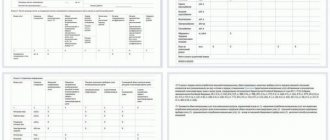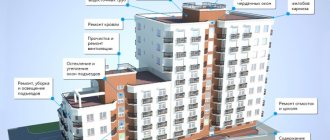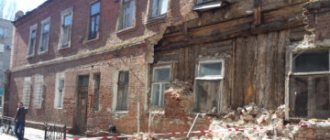What is included in the maintenance and repair of housing in the receipt in 2021
Maintaining a home in proper condition requires constant participation from utility services. This concerns the preservation of the external attractiveness of the object, as well as the safety of its main communications. Such work is accompanied by large financial investments, so citizens who own apartments in apartment buildings are required to make regular contributions for ongoing repairs.
Most types of costs are associated with the off-season. Preparation for changing weather conditions, as well as organizing work to strengthen and insulate structures. Thus, this year the range of responsibilities of public utilities and management companies includes the following types of work:
- strengthening water flows;
- roof repairs to prevent possible leaks;
- insulation and repair of facades;
- strengthening and repairing stairs;
- arrangement of canopies, railings, porches;
- organization of insulation of windows and doors;
- arrangement of locking devices for doors in order to preserve heat in the entrance and to guarantee the safety of citizens’ property;
- dyeing works;
- landscaping, caring for flower beds and trees, watering plants in areas;
- arrangement and maintenance of playgrounds for children, timely repair of structures, painting and bringing into proper condition;
- seasonal cleaning, which includes raking leaves, clearing snow;
- monitoring the serviceability of communications, preventing their breakdowns, identifying areas that require replacement due to wear;
- response to accidents, emergency elimination of consequences and repair of affected areas;
- serviceability of electrical appliances in public use.
The law does not provide a complete list of such work. What responsibilities will fall on the management company depends on the category of the house, its location and potential problems. Therefore, all individual conditions are prescribed in an agreement drawn up between residents and the management organization. Depending on the entrusted functions, the amount of cash payments for the work performed will be fixed.
All of the above services are available to residents based on their home care fee. But this list is not exhaustive: at general meetings, residents often make additions and adjustments to the list. At such meetings, participants in the discussion are also representatives of housing and communal services, who draw up a protocol. After it is signed by representatives of the management company and residents, the protocol legally comes into force.
Tariffs are set taking into account the opinions of residents. But often management companies determine their size arbitrarily, without meetings between residents. At the same time, each apartment owner has the right to check tariffs.
If at a general meeting the residents themselves pre-calculated the tariffs and determined that the management company deliberately inflates them, or that company representatives do not provide the services for which people pay, then they have the right to approve new tariffs. Appropriate adjustments and corrections are made to the existing agreement for the provision of services. The management company is obliged to change the amount of payment.
There is no need to pay separately for the maintenance of elevators and garbage removal, since they are included in the list of house maintenance works. If violations are identified at a general meeting, residents should request that representatives of the management company remove this line from the utility bill receipt.
If the receipt has a special line dedicated to lighting of common areas, home maintenance should have a lower cost.
When the residents of a house are well aware of the contract for house maintenance, they can monitor the performance of services and, if their quality is poor, complain to higher authorities. Who will consider the complaint? Lawyers recommend filing a collective complaint or claim; it will give greater effect:
- First of all, you need to complain about the work of the management company to its management. Perhaps someone will be skeptical about this method of influencing janitors or plumbers, but management may not be aware of the negligent work of their employees.
- If the management corresponds to its team, you need to write a complaint to the Housing Inspectorate, to Rospotrebnadzor. These bodies have the ability to influence the management company and other institutions in the public utilities sector.
- If there are facts of fraud or misappropriation of residents' money, you can contact the prosecutor's office. But the complaint must be accompanied by significant evidence of wrongdoing.
- And the last step is the court, it also needs significant evidence in the case, as well as regarding attempts to pre-trial resolve the problem.
What is included in the monthly payment for housing maintenance?
The management company is obliged to maintain the common premises and equipment of an apartment building in proper condition. First of all, we are talking about places with high traffic:
- Elevator equipment;
- Staircases;
- Corridors and entrance area.
To do this, the residents of the house decide to enter into an agreement with a specific service organization, after which each owner signs an agreement on the basis of property documents.
If the climate becomes humid and damp in the fall, such work is carried out in the summer months. During the winter months, the management organization must deal with frozen ice and snow accumulation. The following mandatory work is carried out:
- Repair work to keep drains and roofs in good condition;
- Repair of window and door units in entrances and on floors, with the exception of private apartments;
- Checking the facade and correcting defects if they appear;
- Maintaining fences, railings, and driveway canopies in proper condition;
- Caring for plants growing near the house;
- Painting of all structures on the territory, removal of old wood and leaves, removal of snow and ice;
- Cutting down trees if they pose a threat to people, homes and common property;
- Repairing playgrounds and checking their safety;
- Regular cleaning of entrances;
- Cleaning, monitoring the filling of garbage containers;
- Telephone support for residents in case of emergency;
- Technical work and inspection of systems responsible for water supply, sewerage, heat and electricity supply;
- Repair of technical premises and devices.
Residents must have access to up-to-date information on tariffs, work carried out and planned. Moreover, they should not be provided with generalized information on objects. Data is provided for a specific apartment building.
Services must be disclosed in detail in the form of an annex with current tariffs. If there is a change in the payment amount, residents are informed with a list for a specific type of work or service.
The law establishes the requirement that the amount of the fee is set for 1 year and is reviewed no more than once a year. All specified points, including the list of general purpose property, the frequency of services provided and their price must be mentioned in the agreement between the management company and the owners. If the rate does not suit the consumer, he has the right to demand recalculation.
All elements of an apartment building must work without failure. Therefore, the management company should pay increased attention to the possibilities of preventing emergency situations.
This category helps to replace taps, remove blockages in the sewer system, carry out plumbing work, and eliminate any problems associated with the functioning of ventilation, heating and plumbing.
The waste removal category includes all actions of the management company, the purpose of which is to maintain the ideal sanitary condition of the apartment building . In addition to regularly cleaning the local area from debris, this also includes the following operations:
- snow removal and de-icing;
- collection and disposal of sheets;
- watering and mowing lawns;
- caring for flower beds.
What else did we talk about?
On the second day of the online conference, we touched on several more important topics for management organizations:
- What unfortunate formulations about indexation of the amount of payment for residential premises do management organizations include in the management agreement for apartment buildings.
- How to formalize the decision of the general meeting on the new fee amount.
- What consequences await the management organization if it challenges the unreasonable amount of fees established by the owners.
- In what order and where are disputes about collection, recalculation of fees and the procedure for making them considered?
You will find answers to these and other questions in the video recording of the online seminar. And in the handout, we have collected examples of court decisions that will help management organizations build the correct position when disputes arise about establishing the amount of payment for the maintenance and repair of the common property of an apartment building.
First day of the online conference.
Third day of the online conference.
What is included in the maintenance and current repairs of housing in 2021
The column “general household needs” appeared in payment documentation in 2017. This category includes all costs incurred by users for the consumption of resources, namely water and electricity. This means that the ODN category will include expenses for evening lighting of staircase landings in apartment buildings, watering lawns and flower beds, etc.
All apartment buildings require regular attention and timely repairs. These include:
- preventing foundation destruction;
- roofing and facade works;
- water supply maintenance (leaks, troubleshooting)
- replacement and repair of interior decoration;
- cleaning and disinfection of garbage chutes;
- necessary monitoring of the performance of heating, sewerage, ventilation and water supply systems;
- measures for improvement of adjacent territories, repair of roads and pedestrian sidewalks.
These are measures taken by the management company to create normal microclimatic conditions in the house, as well as to prevent problems with the start and end of the heating season.
It must be indicated that the range of work performed within this area should include:
- checking heating systems, timely repair operations;
- quality control of ventilation units;
- checking the integrity of window glass.
The concept of excess area indicates that the user has an excess of square meters according to the law . Consequently, the dwelling has a larger area than required by established state standards and regulations.
The designated concept is used to set a fair rate for users.
To determine the rate, they are guided by the approved standards. The calculator takes into account the following parameters:
- for one person -33 sq. meters;
- for two residents – 42 square meters;
- for three or more – 18 square meters per person.
This is the norm that is used for calculations, but it must be remembered that the minimum indicator increases depending on the decision of local authorities.
So, for residents of Moscow and the Moscow region, an additional 7 square meters are added. In addition, additional relaxations apply to a number of users.
No you can not. This responsibility is assigned to the owners of the premises of an apartment building in Art. 158 Housing Code of the Russian Federation.
These costs can be reduced by eliminating certain types of services at the general meeting. The refusal of residents must be agreed upon with authorized representatives of the management company or HOA.
As a rule, owners refuse services related to a specific entrance. For example, you can refuse to clean staircases. However, then residents must agree to do the cleaning themselves.
If you encounter any difficulties or identify unlawful charges, please contact a lawyer for advice. You can get free legal assistance on our website. Enter your question in the special window.
If the quality of work or services is inadequate, you should contact the management company with a request to reduce the established tariff. If the complaint does not help, in the future you should contact Rospotrebnadzor, and then go to court.
- All news
- Kirovsky district
The basic tariff rate is discussed with residents and agreed upon at a general meeting in the presence of the management company. By law, tariff changes are allowed no more than once a year. If we are talking about buildings that are state or municipal property, then the owners of such real estate, in addition to mandatory transfers for routine maintenance of the building and its planned repairs, additionally pay for the housing itself - on the basis of a social tenancy agreement. In other words, the apartment is rented from the state, and the citizens living there are not its full owners.
It is quite possible to make such calculations yourself - this is a good way to check the integrity of the management organization.
The following calculation options are available:
- using formulas - they must be prescribed in the charter of the management company. Additionally, this information can be found in the primary source - Government Decree No. 354;
- submit a personal request to the settlement department of the institution that issues receipts for payment.
To use the formulas, you will need to have the following data:
- total area of the apartment;
- area of non-residential rooms;
- number of floors in the building;
- lifespan of the house;
- total area of non-residential premises in a high-rise building;
- type of communication.
Depending on the technical equipment of the house, other parameters may be required. They are on the official Internet pages of the Housing and Communal Services.
How is the housing maintenance tariff determined?
Every year the tariff is approved at a general meeting of homeowners. If a person lives in a municipal or state apartment building, then in addition to repairs and maintenance, payment for housing provided under a social tenancy agreement is included. Residents of such houses do not receive a receipt for payment for major repairs, since the burden of maintaining the property falls on the owner - the state or municipality.
Tariffs are formed in four areas:
- payment for the provision of residential premises under a social tenancy agreement;
- fee for current repairs;
- payment for the maintenance of common property;
- fee for major repairs.
Isolation as a separate item, for example, “cleaning the staircase,” is a violation, since this provision is already included in the expense item for maintaining the premises. In other words, you are charged double for one service.
This is important to know: Code of the Russian Federation on Housing and Communal Services 2021
Maintenance and repair of residential premises: tariffs and what is included?
Avoidance of obligations entails liability. Thus, if the owner of a property, despite having a quality service provided to him, does not pay utility companies for it, the latter have the right to limit their provision to him on a personal basis.
When the motive for non-compliance with the contract by the residents of the house was poor quality of work or its complete absence, residents have the right not to pay bills where the housing and communal services issues charges for this. In addition, if there is no agreement between the service agency and the residents, from a legal point of view the company will not be able to challenge its claims against defaulters in court. If there is no document, there is no responsibility for compliance with its terms.
Note! In this case, apartment owners will not be able to complain about negligent organization to higher authorities.
The management company is obliged to maintain the common premises and equipment of an apartment building in proper condition. First of all, we are talking about places with high traffic:
- Elevator equipment;
- Staircases;
- Corridors and entrance area.
To do this, the residents of the house decide to enter into an agreement with a specific service organization, after which each owner signs an agreement on the basis of property documents.
If the climate becomes humid and damp in the fall, such work is carried out in the summer months. During the winter months, the management organization must deal with frozen ice and snow accumulation. The following mandatory work is carried out:
- Repair work to keep drains and roofs in good condition;
- Repair of window and door units in entrances and on floors, with the exception of private apartments;
- Checking the facade and correcting defects if they appear;
- Maintaining fences, railings, and driveway canopies in proper condition;
- Caring for plants growing near the house;
- Painting of all structures on the territory, removal of old wood and leaves, removal of snow and ice;
- Cutting down trees if they pose a threat to people, homes and common property;
- Repairing playgrounds and checking their safety;
- Regular cleaning of entrances;
- Cleaning, monitoring the filling of garbage containers;
- Telephone support for residents in case of emergency;
- Technical work and inspection of systems responsible for water supply, sewerage, heat and electricity supply;
- Repair of technical premises and devices.
Residents must have access to up-to-date information on tariffs, work carried out and planned. Moreover, they should not be provided with generalized information on objects. Data is provided for a specific apartment building.
Services must be disclosed in detail in the form of an annex with current tariffs. If there is a change in the payment amount, residents are informed with a list for a specific type of work or service.
If employees of the housing and communal services service do not carry out certain work, residents can file a collective complaint against the management company or HOA.
It is worth keeping in mind that the tariff includes expenses for the services of accountants, lawyers, managers and other employees of the management company, the number of which can be completely different.
Unfortunately, with constantly changing laws, the burden placed on property owners increases every year.
Often, apartment owners are not interested in the price of services, but in the regularity of their performance. After all, many utility service employees do not perform the entire list of work.
They cite the lack of funds and workers as the reasons for such actions. The frequency and timing of the work must be specified in the contract.
If there is no corresponding section there, then the organization has adopted its own schedules for performing various services.
It can take a long time to figure everything out, so most residents simply don't want to deal with it. And they continue to pay for additional services. But where do the funds go? To understand this, you need to take a closer look at the types of services provided.
Thermal energy is a service for heating hot water. If the wording “locking device” is indicated in the column, this could be payment for an intercom device, an automatic locking device with an electromagnetic lock, or a mechanical combination lock. The column “housing rental” appears on the receipt for residents who enjoy the right to reside in residential premises under a contract.
Go ahead. It often happens that a consumer is in debt. For late payments and non-payment, penalties (fines) are assessed. In the new receipt, thanks to the columns “Calculation of the increasing coefficient” and “Amount of excess payment... using the increasing coefficient...” it will be clearly visible why the amount for utilities has increased.
Let us remind you that the GIS housing and communal services system is a unified information system, which necessarily includes all suppliers of utilities and related services, as well as organizations that service apartment buildings (management companies, HOAs). It contains information about objects, services, tariffs and other important information.
Homeowners can connect to the system and control their payments, received services, and even make payments. In fact, a paper receipt for housing and communal services duplicates the payment information generated in the GIS housing and communal services for the corresponding month.
Thanks to the appearance of identifiers in payment slips, data on payments made through a bank using a paper payment slip automatically enters the Housing and Communal Services GIS.
Also, they will no longer be placed on payment documents for housing and communal services. This is determined by amendments to the Housing Code of the Russian Federation, which came into force at the end of April last year. Now (in 2021) only socially significant and reference information for citizens is allowed to be placed on forms. In addition, there is practically no space left on the form for this.
DHW refers to the provision of hot water supply. The column must be filled out in accordance with legal requirements. There is no charge for the consumption of hot water in situations where there is a hot water heater at home.
The amount of payment for residential premises in dormitories, in HOAs and housing cooperatives
Payment for housing in a hostel rented out to citizens is calculated based on the area of the occupied premises. Persons living in dormitories, as well as citizens living in separate apartments under a social tenancy agreement or as owners, are required to pay utility bills.
Utilities are calculated according to the readings of metering devices, if they are installed, or from consumption standards that are legally approved.
The law provides for the exemption of certain categories of citizens from paying for accommodation in a hostel in premises leased. For example, in educational institutions students who are disabled or orphans may be exempt from fees.
The procedure for determining the amount of payment for residential premises in the cases under consideration is established by the bodies that manage the housing cooperative or HOA, on the basis of the charter and in accordance with the requirements of the law. The body authorized to establish and change the amount of mandatory contributions and payments in these organizations is the general meeting of owners, which is held in the manner and within the time frame established by the housing law and the charter of the HOA or housing cooperative.







